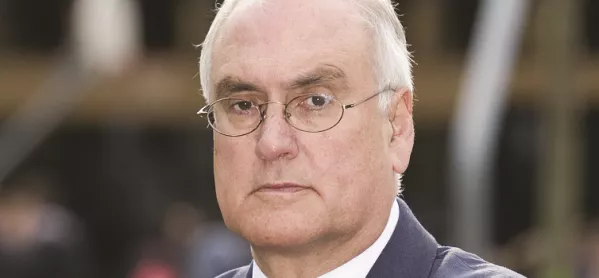Ofsted’s chief inspector has hit out at the “alarming rate of underperformance and failure” in colleges, in his latest outspoken attack on the FE sector.
Speaking at the Baker Dearing conference today, Sir Michael Wilshaw said while there were some excellent FE colleges, nearly half of those inspected by Ofsted in the current academic year had been judged to be less than good.
He also hit out at university technical colleges (UTCs), warning that “radical improvement” was necessary if the 14-19 institutions championed by Lord Baker were to survive.
“Although there are some excellent GFE [general further education] institutions, such as Truro and Penwith, Runshaw and Blackpool and the Fylde college, nearly half of the 71 GFE colleges inspected by Ofsted this academic year have been judged to be less than good - including 10 colleges that were inadequate,” he told the conference.
“This is an alarming rate of underperformance and failure, especially when we remember that the majority of 16- to 19-year-olds are educated in the FE sector.
“Right across the country, we find colleges that simply aren’t delivering what’s needed. In too many cases, inspectors are coming across weak provision, characterised by poor outcomes for learners and apprentices, high drop-out rates and sub-standard work experience placements that fail to develop students’ industry-specific skills.”
‘You need to be doing significantly better’
Sir Michael also referred to the furore caused by his claim earlier this year that 16-19 education should be done in schools. He told this morning’s conference that his views had landed him “in all sorts of trouble with the FE sector”, but they had arisen “from exasperation with the status quo and the glacial pace of change”.
“They reflected my concern that too many GFE colleges are still packing their curriculum with low-quality courses that fail to match the skills gaps in the local and national labour market,” he added. “And they betrayed my frustration with the fact that so many young people who failed to reach the grade in maths and English at 16 still haven’t got these key qualifications two years later.”
Martin Doel, chief executive of the Association of Colleges, said Sir Michael had failed to point out that the sample of inspected colleges was skewed by “Ofsted’s risk-based approach [which] focuses inspections on colleges with weaker results”.
“In the past three years colleges have also been directed to redress the lack of English and maths skills of students who have not achieved benchmark standards by age 16,” he added. “This has been a massive task, with 70 per cent of 16-year-old college entrants needing to resit GCSE English or maths, which has involved some colleges entering over 1,000 students for these exams.
“Understandably, seeking to do in two years what schools have had five years to achieve, has had an effect on the student success rates upon which colleges are assessed, with a corresponding impact on inspection grades. Performance in this new role is improving with support from the Education Training Foundation, but the size of this challenge needs to be acknowledged by the chief inspector and his staff.”
‘Radical improvement is necessary’
Sir Michael also called for improvements in the performance of UTCs. To date, Ofsted has inspected 15 of the 39 UTCs that are open. He told the conference: “One of these - Reading - was judged to be outstanding, seven were good, five required improvement and two were inadequate. You need to be doing significantly better than this, particularly because, unlike GFE colleges, you largely focus on one vocational or technical specialist area. If the UTC movement is to survive and prosper, then radical improvement is necessary. If this doesn’t happen, politicians will come to the conclusion that the model is flawed and not worthy of further political or financial support.
Last year, TES revealed that more than £15 million had been spent on UTCs that were shut down or never opened at all.
FE SPECIAL OFFER: click here to try out a TES Further Education subscription for just £1 for four weeks.
Want to keep up with the latest education news and opinion? Follow TES FE News on Twitter, like us on Facebook and follow us on LinkedIn




